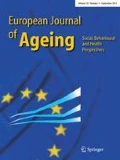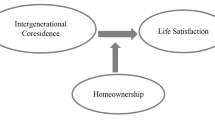Abstract
This study addresses the links between different dimensions of intergenerational family relations (solidarity, conflict, and ambivalence) and subjective well-being (life satisfaction, and positive and negative affects) of older people (aged 75+) using a comparative perspective from a random urban sample in five countries (Norway, England, Germany, Spain, and Israel). Comparative descriptive analyses and multivariate models are presented. Three general conclusions can be drawn. First, the country variables contributed significantly to the explained variance for all three components of well-being, where Israel was most different from the other four countries, except for positive affects, for which Spain and Israel differed from Norway, England, and Germany. However, the countries explained more of the variance for positive and negative affects compared with life satisfaction. Second, the intergenerational family solidarity dimensions contributed significantly to the explained variance for all three components of well-being, although they were differentially related to the different aspects of subjective well-being. Third, personal resources, mainly physical functioning and financial adequacy, were related to all of the well-being variables, although their relative contribution was much stronger for life satisfaction. The importance of intergenerational family relations and personal resources for the subjective well-being of older people and the importance of using multiple measures for outcome variables of well-being are discussed.
Similar content being viewed by others
Notes
OASIS was funded under the 5th program of the European Union, Contract No. QLK6-TC 1999-02182.
References
Antonucci TC, Sherman AM, Akiyama H (1996) Social networks, support and integration. In: Birren JE (ed) Encyclopedia of gerontology. 41:408–416
Aquino JA, Russell DW, Curtona CE, Altmair EM (1996) Employment status, social support and life satisfaction among the elderly. J Couns Psychol 43:480–489
Bengtson VL, Harootyan RA (1994) Intergenerational linkages: hidden connections in American society. Springer, New York
Bengtson VL, Martin P (2001) Families and intergenerational relationships in aging societies: comparing the United States and German-speaking countries. Gerontol Geriatr 34:207–217
Bengtson VL, Schrader S (1982) Parent–child relations. In: Mangen D, Peterson WA (eds) Research instruments in social gerontology, vol 2. University of Minnesota Press, Minneapolis, pp 115–186
Bengtson V, Giarrusso R, Mabry B, Silverstein M (2002) Solidarity, conflict and ambivalence: complimentary or competing perspectives on intergenerational relationships? J Marriage Fam 64:568–576
Boersch-Supan A, Juerges H (2005) The survey of health, aging and retirement in Europe—methodology. Mannheim Research Institute for the Economics of Aging, Mannheim pp 355
Bradburn NM (1969) The structure of psychological well-being. Aldine, Chicago
Chamberlain K (1988) On the structure of subjective well-being. Soc Ind Res 20:581–604
Daatland SO, Lowenstein A (2005) Intergenerational solidarity and the family—welfare state balance. Eur J Ageing 2:174–182
Davey A, Janke MC, Savla JS (2005) Antecedents of intergenerational support: families in context and families as context. In: Silverstein M, Giarrusso R, Begtson VL (eds) Annual Review of Gerontology and Geriatrics: intergenerational relations across time and place 24:29–54
Diener E (1994) Assessing subjective well-being: progress and opportunities. Soc Ind Res 31:103–157
Diener E, Suh EM, Lucas RE, Smith HL (1999) Subjective well-being: three decades of progress. Psychol Bull 125:276–302
Eggebeen DJ, Davey A (1998) Do safety nets work? The role of anticipated help in times of need. J Marriage Fam 60:939–950
Esping-Andersen G (1990) The three worlds of welfare capitalism. Princeton University Press, Princeton
Esping-Andersen G (1999) Social foundations of postindustrial economies. Oxford University Press, Oxford
Fernandez-Ballesteros R, Zamarron MD, Ruiz MA (2001) The contribution of socio-demographic and psychological factors to life satisfaction. Ageing Soc 21:25–43
Fingerman KL, Hay E (2004) Intergenerational ambivalence in the context of the larger social network. In: Pillemer K, Luescher K (eds) Intergenerational ambivalences: new perspectives on parent–child relations in later life. Elsevier Science, Oxford, pp 133–152
Freund A, Baltes PB (1998) Selection, optimization and compensation as strategies of life management: correlations with subjective indicators of successful aging. Psychol Aging 13:531–543
Hilleras P, Jorm A, Herlitz A, Winblad B (1998) Negative and positive affect among the very old: a survey on a sample age 90 years or older. Res Aging 20:593–610
Katz R, Lavee Y (2005) Families in Israel. In: Adams BN, Trost J (eds) Handbook of world families. Sage, Thousand Oaks, pp 486–506
Katz R, Lowenstein A (2003) Elders’ quality of life and intergenerational relations: a cross-national comparison. Hallym Int J Aging 5:131–158
Katz R, Lowenstein A, Phillips J, Daatland SO (2005). Theorizing intergenerational family relations. Solidarity, conflict and ambivalence in cross-national contexts. In: Bengtson VL, Acock AC, Allen KR, Dilworth-Anderson P, Klein D (eds) Sourcebook of family theory and research. Sage, Thousand Oaks, pp 393-402
Kercher K (1992) Assessing subjective well-being in the old-old. Res Aging 14:131–168
Kim HK, Hisata M, Kai I, Lee SK (2000) Social support exchange and quality of life among the Korean elderly. J Cross Cult Gerontol 15:331–347
Krause N, Shaw BA (2000) Giving social support to others, socioeconomic status, and changes in self-esteem in late life. J Gerontol 55B(6):S323–S333
Krause N, Herzog RA, Baker E (1992) Providing support to others and well-being in later life. J Gerontol Psych Sci 47:300–311
Kunzmann U, Little TD, Smith J (2000) Is age-related stability of subjective well-being a paradox? Cross-sectional and longitudinal evidence from the Berlin aging study. Psychol Aging 15:511–526
Lee GR, Netzer JK, Coward RT (1995) Depression among older parents: the role of intergenerational exchange. J Marriage Fam 57:823–833
Lee MS, Crittenden K, Yu E (1996) Social support and depression among elderly Korean immigrants in the United States. Int J Aging Hum Dev 42:313–327
Lowenstein A (2007) Solidarity–conflict and ambivalence: testing two conceptual frameworks and their impact on quality of life for older family members. J Gerontol Soc Sci 62B:S100–S107
Lowenstein A, Ogg J (2003) OASIS: old age and autonomy, the role of service systems and intergenerational family solidarity—final report. The Center for Research and Study of Aging, the University of Haifa, Haifa, Israel
Lowenstein A, Katz R, Gur-Yaish N (2007) Reciprocity in parent–child exchange and life satisfaction among the elderly: a cross-national perspective. J Soc Issues 63:865–883
Luescher K (2004) Conceptualising and uncovering intergenerational ambivalence. In: Pillemar K, Lüscher K (eds) Intergenerational ambivalences: new perspectives on parent–child relations in later life. Elsevier Science, Oxford, pp 23–62
Luescher K, Pillemer KA (1998) Intergenerational ambivalence: a new approach to the study of parent–child relations in later life. J Marriage Fam 60:413–425
McCamish-Svensson C, Samuelsson G, Hagberg B, Svensson T, Dehlin O (1999) Social relationships and health predictors of life satisfaction in advanced old age: results from Swedish longitudinal study. J Aging Hum Dev 48:301–324
McNeil JK, Stones MJ, Kozma A (1986) Subjective well-being in later life: issues concerning measurement and prediction. Soc Indic Res 18:35–70
O’Connor BP (1995) Family and friend relationships among older and younger adults: interaction motivation, mood and quality. Int J Aging Hum Dev 40:9–29
OECD: Social Policy Studies (1996) Caring for frail elderly people: policies in evolution. No. 19. OECD, Paris
Pillemer K (2004) Can’t live with ‘em, can’t live without ‘em: Mothers’ ambivalence toward their adult children. In: Pillemar K, Lüscher K (eds) Intergenerational ambivalences: new perspectives on parent–child relations in later life. Elsevier Science, Oxford, pp 115–132
Pillemer K, Luescher K (2004) Intergenerational ambivalences: new perspectives on parent–child relations in later life. Elsevier, London
Pillemer K, Suitor JJ (2002) Explaining mothers’ ambivalence toward their adult children. J Marriage Fam 64:602–613
Pinquart M, Sorensen S (2000) Influences of socioeconomic status, social network, and competence on subjective well-being in later life: a meta-analysis. Psychol Aging 15:187–224
Rossi AS, Rossi PH (1990) Of human bonding: parent–child relations across the life course. Aldine de Gruyter, Hawthorne
Ryff CD (1995) Psychological well-being in adult life. Curr Dir Psychol Sci 4:99–104
Schilling OK (2005) Cohort- and age-related decline in elder’s life satisfaction: is there really a paradox? Eur J Ageing 2:254–263
Shmotkin D (2005) Happiness in the face of adversity: reformulating the dynamic and modular bases of subjective well-being. Rev General Psy 9:291–325
Silverstein M, Bengtson VL (1991) Do close parent–child relations reduce the mortality risk of older parents? J Health Soc Behav 32:382–395
Silverstein M, Bengtson VL (1994) Does intergenerational social support influence the psychological well-being of older parents? The contingencies of declining health and widowhood. Soc Sci Med 38:943–957
Silverstein M, Bengtson VL (1997) Intergenerational family solidarity and the structure of adult child–parent relationships in American families. Am J Sociol 103:429–460
Silverstein M, Chen X, Heller K (1996) Too much of a good thing? Intergenerational social support and the psychological well-being of older parents. J Marriage Fam 58:970–982
Stallings MC, Dunham CC, Gatz M, Baker LA, Bengtson VL (1997) Relationships among life event and psychological well-being: more evidence for a two-factor theory of well-being. J Appl Gerontol 16:104–119
Trommsdorff G, Nauck B (2005) The value of children in cross-cultural perspective. Pabst, Lengerich
Umberson D (1992) Relationships between adult children and their parents: psychological consequences for both generations. J Marriage Fam 64:664–674
Venkatraman MM (1995) A cross-cultural study of the subjective well-being of married elderly persons in the United States and India. J Gerontol 50B(1):S35–S44
Ware JE, Sherbourne CD (1992) The MOS 36-item short-form health survey (SF-36). Med Care 30:473–483
Watson D, Clark LA, Tellegen A (1988) Development and validation of brief measures of positive and negative affect: the PANAS Scales. J Pers Soc Psychol 54:1063–1070
Wilson AE, Shuey KM, Elder GH Jr (2003) Ambivalence in the relationship of adult children to aging parents and in-laws. J Marriage Fam 65:1055–1072
Author information
Authors and Affiliations
Corresponding author
Rights and permissions
About this article
Cite this article
Katz, R. Intergenerational family relations and subjective well-being in old age: a cross-national study. Eur J Ageing 6, 79–90 (2009). https://doi.org/10.1007/s10433-009-0113-0
Published:
Issue Date:
DOI: https://doi.org/10.1007/s10433-009-0113-0




